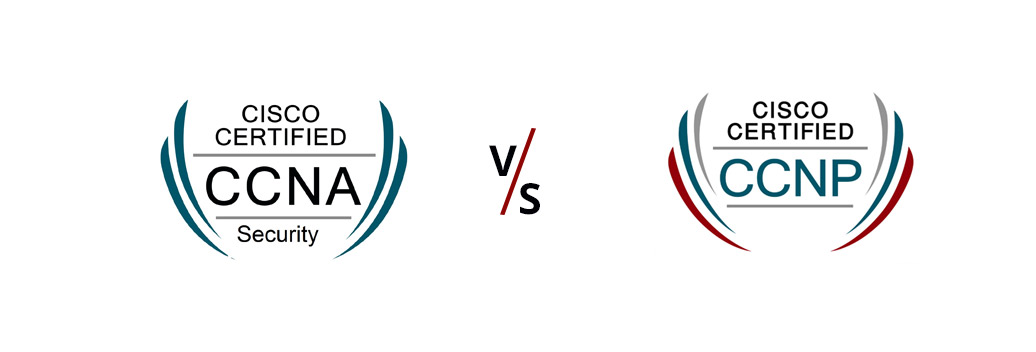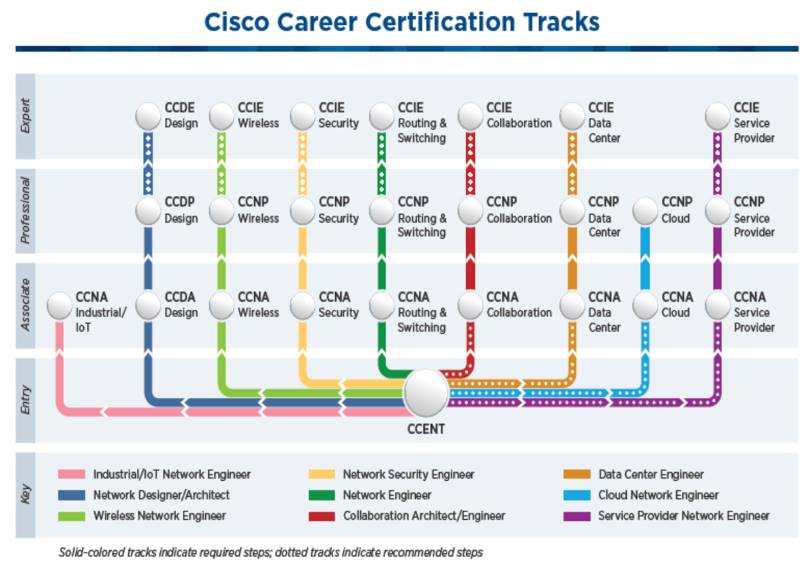CCNA Vs CCNP: Fundamental differences every budding Networking Aspirant must know
Introduction
Most of the students and professionals are in a dilemma of choosing the right career in the Networking domain. Excellent Careers awaits freshers and experienced professionals who want to get good job offers in top software companies if they pass Internationally Certified Courses. Cisco Systems which is one of the leading giants in Networking offers various international certifications like CCNA, CCNP, CCIE to name a few.
Many young aspirants are not clear about whether to get trained and certified in CCNA or CCNP. They look for suggestions from experts on choosing the right path. This article will act as a platform to help them clear their doubts and choose between CCNA or CCNP.
Many networking certifications are available, but all major software companies prefer Cisco accredited networking certifications the most. Cisco certification exams can be taken online; certificates are received by test takers after successfully clearing the exams directly by Cisco Systems, USA. Both hard and soft copy of the certificates is available.
The biggest advantage in getting the CCNA and CCNP Certifications is that you get certified directly by CISCO, USA; Whereas, doing a networking course from a local center only gets you certification from the local computer training center. Having an internationally recognized certification like CISCO directly helps you in finding your desired job in the networking industry.
CCNA and CCNP certifications help professionals get very good jobs as well as expertise in the area of networking. Apart from getting jobs in networking, CCNA and CCNP certifications also help you in mastering routing protocols like rip, EIGRP, and OSPF.
The most important fact is that these certification programmes are not restricted to a particular stream. Students and working professionals from various backgrounds like B.E., B. Tech, MBA, Diploma, and B.Sc. can undergo training for CCNA and look for career opportunities within networking within software companies.
Most of the students and professionals are often confused about whether to choose between CCNA or CCNP or both. Let us first discuss the major differences between CCNA and CCNP.
Sample logos of various Cisco certifications
Different Levels of Cisco Certifications
Cisco Systems offers different levels of Certifications in various networking domains, these are:
- Entry Level
- Associate Level
- Professional Level
- Expert Level
- Architect Level


Image Source: https://www.cisco.com/c/en/us/training-events/training-certifications/certifications/architect/ccar.html
ENTRY LEVEL
For entry level, two certifications are available namely:
- CCENT and CCT.
- CCENT- Cisco Certified Entry Networking Technician.
- CCT-CISCO Certified Technician.
Both these certifications are useful for basic management of a small networking company and can act as a first step towards CCNA certification.
ASSOCIATE LEVEL
In the Associate Level there are 9 certifications namely:
- CCDA-Cisco Certified Design Associate
- CCNA Cloud
- CCNA Collaboration
- CCNA Data Center
- CCNA Industrial
- CCNA Routing and Switching
- CCNA Security
- CCNA Service Provider
- CCNA Wireless
CCDA deals with the design part of Cisco Devices whereas CCNA focusses on Cisco devices like Routers and Switched Configuration and Troubleshooting. As we can see, many CCNA certifications are available but the most preferred certification is CCNA (Routing and Switching).
PROFESSIONAL LEVEL
In the Professional level, there are 8 categories of certifications, these are:
- CCDP
- CCNP Cloud
- CCNP Collaboration
- CCNP Data Center
- CCNP Routing and Switching
- CCNP Security
- CCNP Service Provider
- CCNP Wireless
EXPERT LEVEL
These are the 6 certifications available at the expert level:
- CCDE
- CCIE Collaboration
- CCIE Data Center
- CCIE Routing and Switching
- CCIE Security
- CCIE Service Provider
- CCIE Wireless
ARCHITECT LEVEL
The Architect level which is the highest level of Cisco certifications available.
Only one exam is available in this level: CCAr-Cisco Certified Architect.
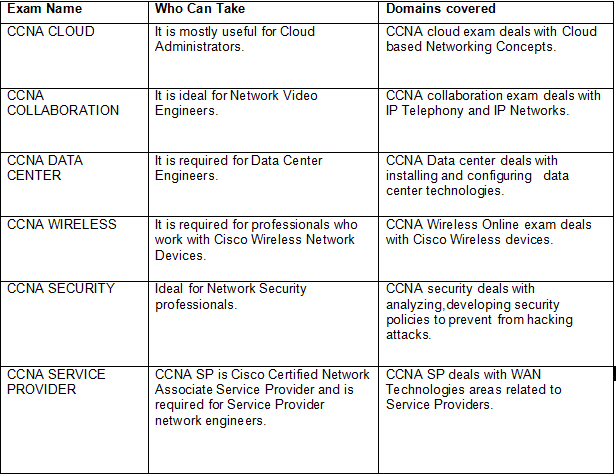
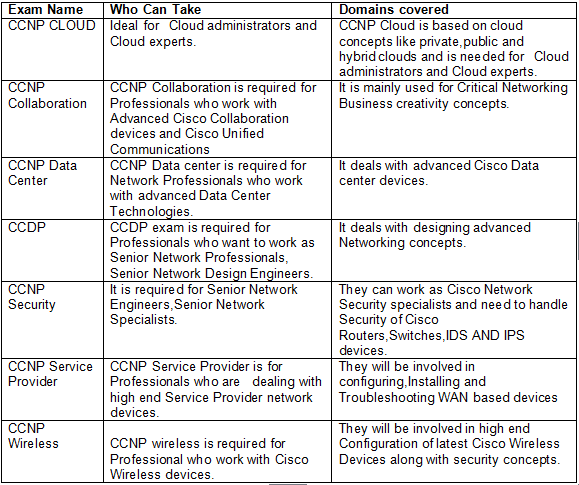
In this article, we will mostly be dealing with CCNA and CCNP certifications of Routing and Switching areas. Let’s explore some of the major differences between the two certifications:
Key Points of Difference Between CCNA and CCNP
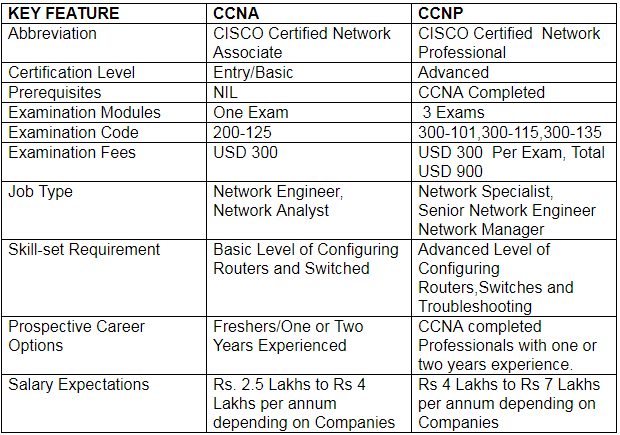
Both CCNA and CCNP certifications are accredited by Cisco Systems, but they both vary based on your requirements. Before we focus on CCNA and CCNP let us explore in detail and have a clear idea about the various elements of the two certifications.
What is CCNA?
CCNA stands for Cisco Certified Network Associate. It is an associate-level certification in the Networking domain.
Exam Code: 200-125
Duration: 90 minutes
Number of Questions: 50 to 60
Some of the important topics covered under CCNA:
- Introduction to Network Concepts
- TCP/IP Layers
- OSL Models
- IPV4 and IPV6
- LAN/WAN Protocols
- Static and Dynamic Route
- VLAN
- VTP TPdes
- Wan Technologies
- ACL and NAT concepts
- Cisco Routers and Cisco Switches Configuration
- Cisco Discovery Protocol
- EtherChannel
- Cabling concepts
Exam Duration:
CCNA can be done on different tracks like routing and switching, security, voice, and data center etc. Students and professionals can choose their own area and go for the online exams. There are many online exams centers available in India in different cities.
CCNA exam duration is around 120 minutes The exam has about 50 questions comprising of both multiple choices and simulations. In the simulation part, the students are required to configure routers, this tests your skills in routing and switching, configuration and troubleshooting.
You may also like:5 Tips For Acing Your CCNA Exam
Eligibility criteria:
Freshers or experienced with little networking knowledge can appear for CCNA online exam. Students holding degrees like BE, B.Tech, MBA, MBA, MCA, and Diplomas are all eligible to appear for CCNA exam.
Examination Fee:
CCNA exam costs USD 300.
Exam Centre:
CCNA exam can be taken in any authorized Pearson Vue exam center.
Salary Expectations:
Once a student clears CCNA exam he can apply for Networking jobs. Most of the companies prefer CCNA certified professionals. The Salary package per month varies from INR 10,000 to 25,000 and above based on cities and company.
Benefits of CCNA Certification:
CCNA Exam not only helps to get an entry into the networking domain but also acts as a platform to learn Routing and Switching concepts. It moulds the learner into a good Network Engineer, also ensuring a good job in networking companies. Even as a basic entry level Network Certification, CCNA is an important path for entering into the networking domain and therefore many companies have CCNA as their basic requirement for networking jobs.
Related reading: Top 60 CCNA Interview Questions and Answers (Updated for 2018)
Job Roles in CCNA:
Once you are CCNA certified, you can work as Network Associate, Network Analyst and Network Engineer based on the companies. Most of the jobs involve configuring Cisco Routers and Cisco Switches. Some major job functions are:
- Install Cisco Networking Devices at the basic level of Operations.
- Monitor and configure Cisco Routers and Switches.
- Ensuring security of all your devices.
- Recovering passwords and take up backups.
Job Opportunities with CCNA:
CCNA certifications give you an edge over all other certifications as most of the software and IT companies use Cisco devices for network infrastructure.
You can early clear the interview questions using your knowledge of Routing and Switching gained from the CCNA.
CCNA exam validity:
CCNA exam is valid for three years. To recertify professionals can appear for any CCNP exam before expiry date or can also update their certifications with CCIE written exam.
What is CCNP?
CCNP stands for Cisco Certified Networking Professional. It is an advanced level certification course in the Networking domain. You need to clear all the three modules to obtain this certification. They are:
300-101 Route
300-115 Switch
300-135 TShoot
Why CCNP?
CCNA helps you to enter into Networking Domain as a fresher, but the next level Certification, CCNP helps you to master advanced Routing and Switching areas.
CCNP plays a vital role in imparting expertise in WAN areas especially using BGP Protocol.
300-101 Route
Duration: 120 minutes
Number of Questions: 50 to 60
Exam Pattern: Multiple Choice Questions and Lab Simulation
Some of the major topics covered in ROUTING exam (300-101):
- Cisco Express Forwarding Principles
- IPV4
- IPV6
- UDP
- TTL
- FIB
- PAP
- CHAP
- Frame Relay
- Distance Vector
- Link State
- Path Vector
- RIP
- EIGRP
- OSPF
- RIPng
- BGP
- Route Maps
- Stub concepts
- GRE
- DMVPN
- Easy Virtual Networking
- PAT
- SNMP
- DHCP Relay
- DHCP Server
- DHCP Client
- SYSLOG
- ARP
- UNICAST
- EUI-64
- Static Routing
- Dynamic Routing
- Passive Interfaces
- AAA
- ACACS+
- RADIUS
- Telnet
- SSH
- DHCP
- ICMP
- NAT
- NTP
- Netflow
- SLA Architecture
- Static NAT
- Dynamic NAT
- NSSA
- LSA Types
- Split Horizon
- Route Poisoning
- Suboptimal Routing
Also read: Top 5 Career Pointers for the CCNA Holder
300-115 Switch
Duration: 120 Minutes
Number of Questions: 45 to 55
Exam Pattern: Multiple Choice Questions and Lab simulations.
Some of the major topics covered in switch 300-115:
- CDP
- LLDP
- UDLD
- Access Ports
- VLAN Database
- Dot1q
- Native VLAN
- LACP
- PAgp
- EtherChannel
- PVST+
- RPVST+
- MST
- STP
- SPAN
- RSPAN
- Normal VLANs
- Extended VLANs
- VTP pruning
- Path Cost
- DHCP snooping
- IP Source Guard
- Port Security
- Storm Control
- Dynamic ARP
- Redundancy
- HSRP
- VRRP
- GLBP
300-135 Tshoot
Duration: 120 Minutes
Number of Questions: 15 to 25.
Exam Pattern: Mostly Lab simulations with Troubleshooting.
Some of the major topics to be covered in Tshoot:
- Switching
- Link Aggregation Protocols
- Routing
- InterVLAN Routing
- OSPF
- EIGRP
- BGP
- RIP
- HSRP
- GLBP
- STP
- VRRP
- CISCO IOS Troubleshooting
- VLAN Troubleshooting
- CDP, LLDP, UDLD Troubleshooting
- LACP, Pagp Troubleshooting
- LoopGuard, Root Guard Troubleshooting
- SPAN, RSPAN Troubleshooting
- VTP Modes
- Troubleshooting EIGRP
- Troubleshooting BGP
- Troubleshooting OSPF
- IPV4 and IPV6 Troubleshooting
- EBGP Troubleshooting
- BGP Troubleshooting
- GRE Troubleshooting
- AAA Troubleshooting
- ACL, NAT Troubleshooting
CCNP Exam Cost:
Each exam costs USD 300. Since you need to appear for 3 exams the total cost comes around USD 900.
Exam Centre:
CCNP exams can be taken in any authorized Pearson Vue Centres near your area all over India and internationally.
Eligibility Criteria for CCNP Exam:
Professionals who have Passed CCNA can appear for CCNP.
Salary Expectations:
Any student who passes CCNP can expect a higher salary. The salary package may vary based upon the experience and can vary from INR 20,000 to 50,000 as per cities and company.
Job Opportunities with CCNP:
CCNP certified professionals are. given top priority in most of the Software Companies especially for senior positions which require high-end Routing and Switching Configuration along with Troubleshooting.
They get high paid based on skills and experience both in India and Overseas. In most cases, CCNP certified Professionals receive job offers for senior positions almost immediately.
CCNP exams validity:
CCNP exams are valid for three years. For recertification, professionals can appear and pass CCIE written exam before the certification expiry date.
Job Roles in CCNP:
CCNP professionals can work as a Network Specialist, Senior Network Engineer, and Network Manager. Job responsibilities include: Installing and Configuring Cisco Devices, Securing Routers, and Switches, Monitoring, Troubleshooting, Recovery and firewall configuration.
Major job functions are:
- Configuring Cisco Routers and Switches.
- Configuring Security based on AAA.
- Ensuring Packet Filtering based on Network Traffic.
- Ensuring Quality of Service.
- Implementing class-based policies based on Network Management.
- Creating Intervlan Routing
- Maintaining and Monitoring WAN networks.
Benefits of CCNP:
There are many benefits of CCNP certifications. CCNP professionals get paid more than normal network engineers. They get to learn about advanced BGP Routing Concepts.
Normally BGP concept is not covered in CCNA. BGP Protocol plays a major role in Routing configuration WAN Technologies.
CCNP helps you to master Routing Protocols like RIP, EIGRP, and OSPF as you learn them in depth. The CCNP Troubleshoot exam helps you to troubleshoot major faults which is a vital job for a network engineer.
Passing CCNP certifications also help you to upgrade your CCNA certification which is valid only for three years. CCNP has more practical in-depth coverage as compared to CCNA. You will be configuring various advanced level Routing Protocols and ensuring Security Mechanism. CCNP also teaches you the most important part of Troubleshooting, which is very important to learn since the major role Network Engineers involves troubleshooting routers and switches.
Troubleshoot certification requires test takers do a practical simulation of Troubleshooting many faults which have occurred in Routers and Switches. This helps them handle Troubleshooting in real time.
Which Certification is Better: CCNA or CCNP?
CCNP is offer considered better than CCNA in terms of better job opportunities and high salary package, but both certifications are equally important. One cannot directly do CCNP without being CCNA certified. To get an entry into networking domain, you will need to start with CCNA and work in a good company for a year and two and later do the CCNP for better career growth and shifting to a new job easily. Simply put, one can get CCNA certified to start as a fresher and enter into networking domain and after gaining one or two years of work experience, you can go for the CCNP.
Experienced professionals who are already CCNA certified, can directly go for CCNP which will play a vital role in getting promotions and increment in salary along with the chance of getting a better job both in India and abroad.
Explore 10 Reasons To Get A CCNA Certification
Conclusion
On a concluding note, both CCNA and CCNP help you to get a good pay package and a great career in networking. CCNA, on one hand, helps you to enter into networking domain as a fresher, CCNP on the other helps to you master networking technologies especially BGP technologies and acts as the stepping stone to get promotions and excellent salary.
While CCNA helps you to choose your career Network Engineer and get a decent job in networking, CCNP acts as a vital certification for promotions and in-depth knowledge in areas of Routing and Switching.
In short, both the certifications are required to earn a handsome salary as well as for gaining expertise in Networking Technologies. As such, we can say that CCNA acts as the prerequisite for CCNP.
